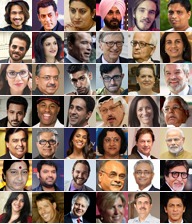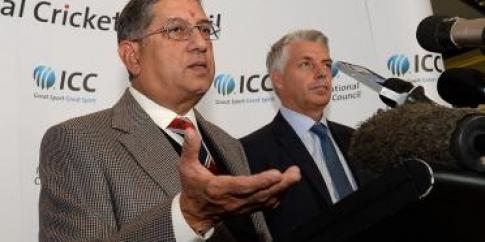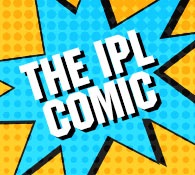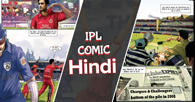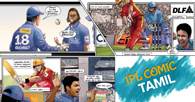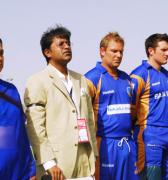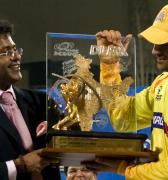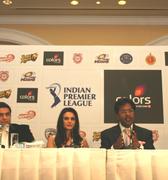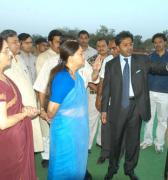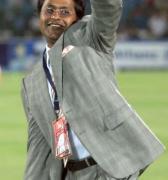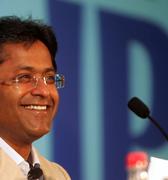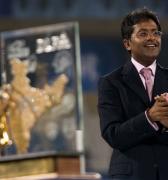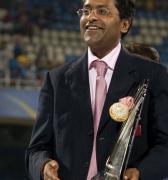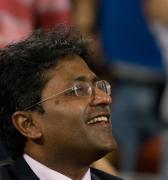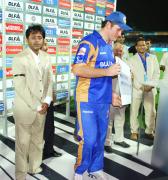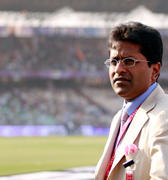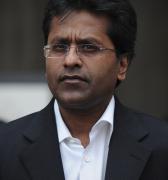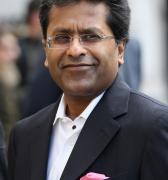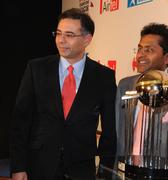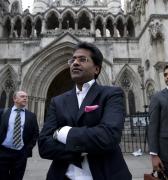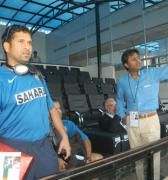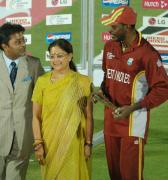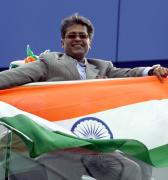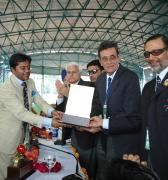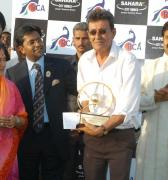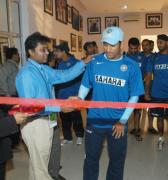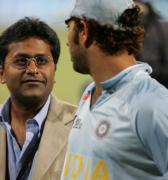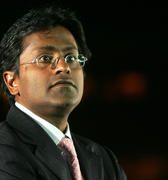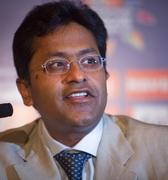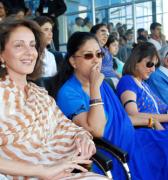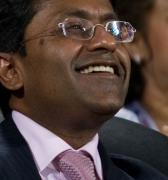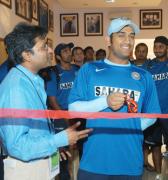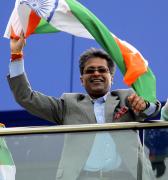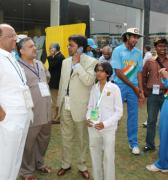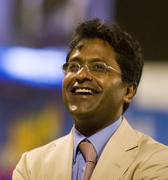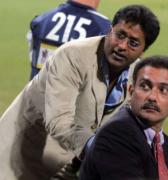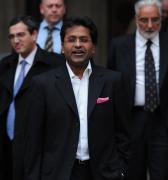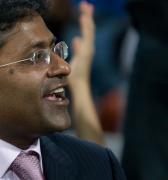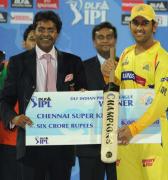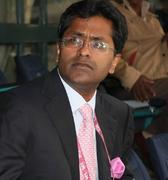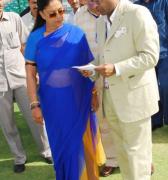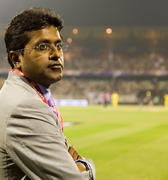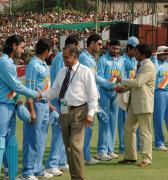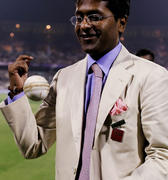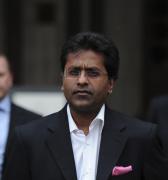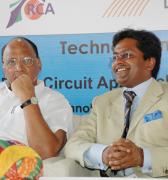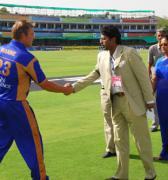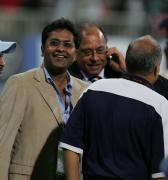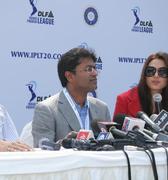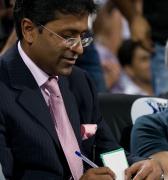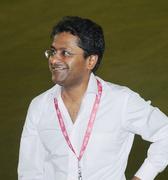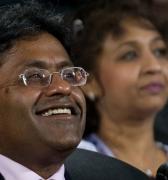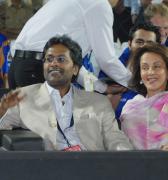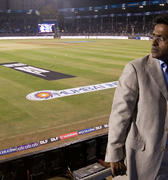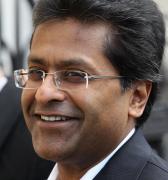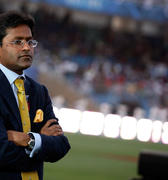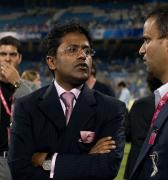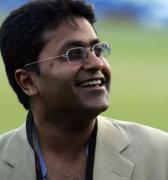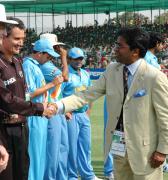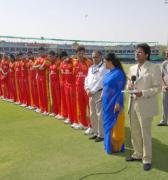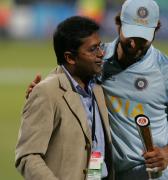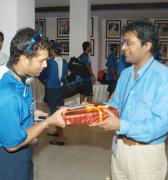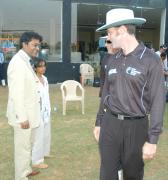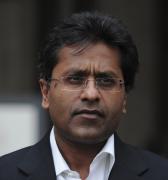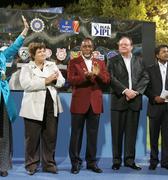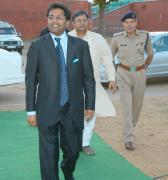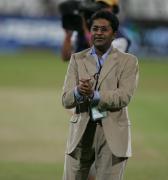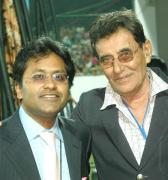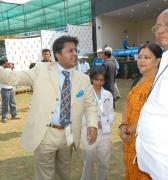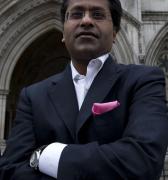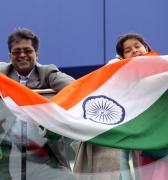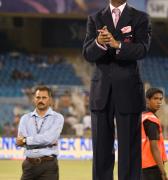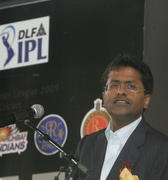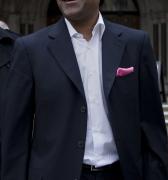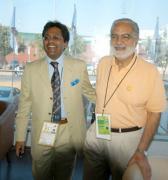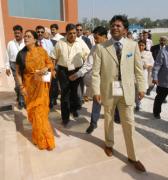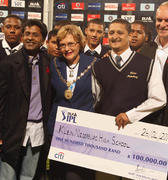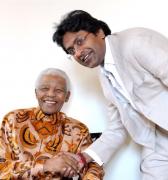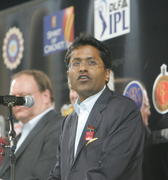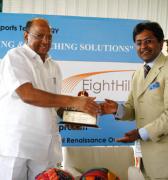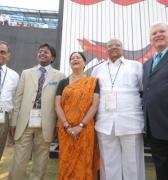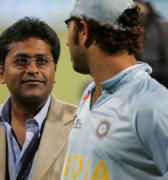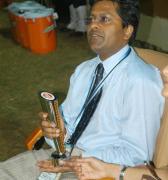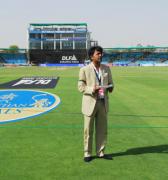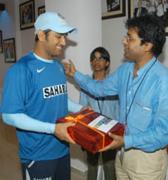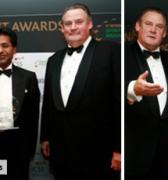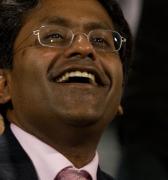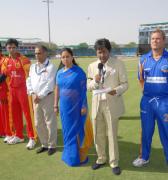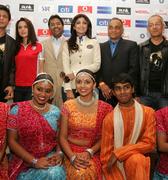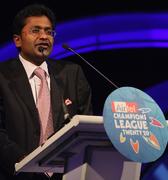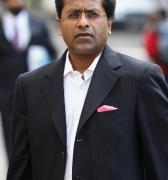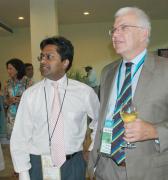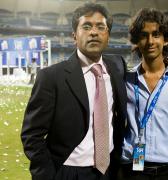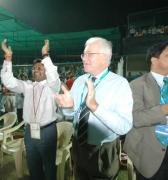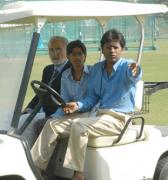Did Srinivasan, Shah 'hijack' crucial BCCI meeting?
Friday 21 July 2017
Did Srinivasan, Shah 'hijack' crucial BCCI meeting?
N Srinivasan, despite being disqualified, attended the BCCI's SGM on June 26
Have N Srinivasan and Niranjan Shah acted disruptively and subversively in the BCCI's efforts to implement the Lodha recommendations, as the Committee of Administrators (CoA) complained to the Supreme Court? Did the pair "hijack" proceedings at the BCCI's crucial June 26 special general meeting (SGM), where another delaying tactic - the creation of a special committee - was agreed upon?
As the BCCI continues to dawdle over the implementation of the Lodha Committee's recommendations - most of which are now pending for over a year - Srinivasan's influence in that movement has come under attention. As per the minutes of the SGM on June 26, seen by ESPNcricinfo, Srinivasan and Shah had a prominent voice against what appeared to be a majority view of BCCI members, who wanted to find some middle ground between rejecting and implementing the recommendations.
The SGM was significant because of its single-point agenda: deliberation on the implementation of the Lodha Committee recommendations. It ended with the formation of a seven-member committee to put together "critical points" on the major reforms BCCI members were opposed to, which will then be presented to the Supreme Court.
The CoA subsequently submitted a status report to the court saying the SGM was "hijacked" by disqualified administrators like Srinivasan and Shah, who had a "vested" interest against adopting reforms because it would mean ceding the "control" they held for decades over their state associations, and by extension, the BCCI.
Both Srinivasan and Shah attended the SGM as representatives of their respective state associations, even though they were in breach, as per the eligibility criteria set by the Lodha Committee, having exceeded the 70-year age-cap which is meant for the representatives also.
The SGM was dominated by three voices: the BCCI secretary Amitabh Choudhary, Srinivasan and, as a moderating voice, Jyotiraditya Scindia, representative of the Madhya Pradesh Cricket Association. The meeting began with Choudhary bringing members up to speed with developments since the SGM on October 1 last year, which was the last time the recommendations were discussed by the state associations.
Although the members were in favour of adopting "80-85%" of the reforms then, there was a recognition that some were just "insurmountable" and needed reconsideration.
The CoA was sympathetic to that assessment. According to Choudhary, the CoA "shared misgivings" over three recommendations: one-state-one-vote, the three-year cooling-off period for an administrator and the reduction in the size of the selection panel.
The CoA also said the court could be asked to modify those recommendations that could not be adopted by the BCCI. In the SGM in June, Choudhary repeatedly stressed on the importance of showing to the court the progress the BCCI had made in implementing reforms. He said that the court could take some drastic action if that wasn't the case. "Beyond that I see only peril," Choudhary warned.
Srinivasan remained unaffected. Attending as a representative of the Tamil Nadu Cricket Association (TNCA), Srinivasan seemed to argue that the strength of the objections of state associations gave them legal leverage. He said that 19 state associations had already filed petitions against the original court order of July 18 last year. "I think we have to see what is the practical situation," Srinivasan said, as per the transcript of the SGM minutes. "The practical situation is 19 members of this BCCI have filed affidavits in the Supreme Court. They have filed affidavits where they have challenged the orders of 18th July and they have asked many reliefs.
"So we cannot today, irrespective, even if there is somebody having a gun to my head saying I will shoot you, I cannot change that affidavit. That affidavit, you know, it's in the Supreme Court. I cannot today say I change something."
Srinivasan also pointed out that both Anurag Thakur and Ajay Shirke were sacked by the court as BCCI president and secretary respectively in January for failing to implement the court order. If the BCCI were to now "dilute" its position, it would be letting them down.
"The president of the BCCI, Anurag Thakur, and Ajay Shirke, the secretary, were found fault with saying you fellows did not do anything to implement," Srinivasan said. "Now if I agree to any suggestion to modify or dilute stand we have taken, then we are completely letting down Anurag Thakur and Ajay Shirke because that means they could have done something, they did not. CoA has persuaded these people to change. So, our original decision on these two fellows are right. I am sorry gentlemen. There is no way in which we should alter anything because that will hit our former president and secretary."
One of those 19 affidavits came from the Saurashtra Cricket Association, represented by Shah. He reiterated the SCA stance in the SGM, pointing out that it did not agree with some of the recommendations approved by the court.
In contrast, Scindia advised caution to the board members. He said the BCCI's image to the outside world, not just the court, was "extremely negative" so anything the board said or did would be monitored closely. "There is no easy solution to this. I, for one, feel that today the highest court of the land has pronounced a verdict. We are seen on the outside as an organization that is very obstinate and very stubborn in terms of accepting even what highest court of land has adjudicated."
Scindia also disagreed with the idea of setting up a special committee that would shortlist the main recommendations the board members opposed. The idea, Srinivasan told the SGM, was mooted by Jay Shah, the Gujarat Cricket Association president.
Scindia feared the court might view a special committee as just another "bureaucratic hurdle" put in place by the BCCI. "So the way forward for us is very clear," Scindia said. "To me, it is bi-modal. It is either we go ahead and accept it or (b) if we don't, then we formulate a process with which we say we are going to stick with the [board's] earliest [position], which is what Srinivasan adjudicated, or you look at a mid-path. Those are the three options that are open to you, either you do nothing, or you accept it, or you look at something in between."
Srinivasan then claimed that the Supreme Court had told state associations while accepting their individual affidavits that if it found substance, it would refer the matter to a constitutional bench and that, ultimately, it could "recall" the original order.
Choudhary denied this was the case, and stressed that the court had never made any such statement in writing at least. "They have said, I tell you, they have said: I will hear you. Let us not argue on this," Srinivasan responded to Choudhary. But the BCCI secretary insisted: "The point is, sir, what you actually said is not a part of the order. So these are what we conclude from the body language of the judges or from the informal comments. None of these are part of the order."
Srinivasan interrupted. "Amitabh ji, the court, the newspapers, many informal comments are made. The media has picked and chosen what they wanted to highlight also. I do not, all I am saying is, this is what I heard, if you say this is not… I have no dispute. All I am saying is they are going to hear us."
Eventually, influential administrators like Rajiv Shukla - attending the June SGM as representative from the Uttar Pradesh Cricket Associaton - agreed that the forming of a special committee was a good starting point. Scindia, too, ultimately said he was fine if all members supported such a decision.
In its last hearing on July 14, the court served notices to Srinivasan and Shah, asking them to explain why, despite being disqualified, they attended the SGM. The court is scheduled to hear the matter on July 24.
Have N Srinivasan and Niranjan Shah acted disruptively and subversively in the BCCI's efforts to implement the Lodha recommendations, as the Committee of Administrators (CoA) complained to the Supreme Court? Did the pair "hijack" proceedings at the BCCI's crucial June 26 special general meeting (SGM), where another delaying tactic - the creation of a special committee - was agreed upon?As the BCCI continues to dawdle over the implementation of the Lodha Committee's recommendations - most of which are now pending for over a year - Srinivasan's influence in that movement has come under attention. As per the minutes of the SGM on June 26, seen by ESPNcricinfo, Srinivasan and Shah had a prominent voice against what appeared to be a majority view of BCCI members, who wanted to find some middle ground between rejecting and implementing the recommendations.
The SGM was significant because of its single-point agenda: deliberation on the implementation of the Lodha Committee recommendations. It ended with the formation of a seven-member committee to put together "critical points" on the major reforms BCCI members were opposed to, which will then be presented to the Supreme Court.
The CoA subsequently submitted a status report to the court saying the SGM was "hijacked" by disqualified administrators like Srinivasan and Shah, who had a "vested" interest against adopting reforms because it would mean ceding the "control" they held for decades over their state associations, and by extension, the BCCI.
Both Srinivasan and Shah attended the SGM as representatives of their respective state associations, even though they were in breach, as per the eligibility criteria set by the Lodha Committee, having exceeded the 70-year age-cap which is meant for the representatives also.
The SGM was dominated by three voices: the BCCI secretary Amitabh Choudhary, Srinivasan and, as a moderating voice, Jyotiraditya Scindia, representative of the Madhya Pradesh Cricket Association. The meeting began with Choudhary bringing members up to speed with developments since the SGM on October 1 last year, which was the last time the recommendations were discussed by the state associations.
Although the members were in favour of adopting "80-85%" of the reforms then, there was a recognition that some were just "insurmountable" and needed reconsideration.
The CoA was sympathetic to that assessment. According to Choudhary, the CoA "shared misgivings" over three recommendations: one-state-one-vote, the three-year cooling-off period for an administrator and the reduction in the size of the selection panel.
The CoA also said the court could be asked to modify those recommendations that could not be adopted by the BCCI. In the SGM in June, Choudhary repeatedly stressed on the importance of showing to the court the progress the BCCI had made in implementing reforms. He said that the court could take some drastic action if that wasn't the case. "Beyond that I see only peril," Choudhary warned.
Srinivasan remained unaffected. Attending as a representative of the Tamil Nadu Cricket Association (TNCA), Srinivasan seemed to argue that the strength of the objections of state associations gave them legal leverage. He said that 19 state associations had already filed petitions against the original court order of July 18 last year. "I think we have to see what is the practical situation," Srinivasan said, as per the transcript of the SGM minutes. "The practical situation is 19 members of this BCCI have filed affidavits in the Supreme Court. They have filed affidavits where they have challenged the orders of 18th July and they have asked many reliefs.
"So we cannot today, irrespective, even if there is somebody having a gun to my head saying I will shoot you, I cannot change that affidavit. That affidavit, you know, it's in the Supreme Court. I cannot today say I change something."
Srinivasan also pointed out that both Anurag Thakur and Ajay Shirke were sacked by the court as BCCI president and secretary respectively in January for failing to implement the court order. If the BCCI were to now "dilute" its position, it would be letting them down.
"The president of the BCCI, Anurag Thakur, and Ajay Shirke, the secretary, were found fault with saying you fellows did not do anything to implement," Srinivasan said. "Now if I agree to any suggestion to modify or dilute stand we have taken, then we are completely letting down Anurag Thakur and Ajay Shirke because that means they could have done something, they did not. CoA has persuaded these people to change. So, our original decision on these two fellows are right. I am sorry gentlemen. There is no way in which we should alter anything because that will hit our former president and secretary."
One of those 19 affidavits came from the Saurashtra Cricket Association, represented by Shah. He reiterated the SCA stance in the SGM, pointing out that it did not agree with some of the recommendations approved by the court.
In contrast, Scindia advised caution to the board members. He said the BCCI's image to the outside world, not just the court, was "extremely negative" so anything the board said or did would be monitored closely. "There is no easy solution to this. I, for one, feel that today the highest court of the land has pronounced a verdict. We are seen on the outside as an organization that is very obstinate and very stubborn in terms of accepting even what highest court of land has adjudicated."
Scindia also disagreed with the idea of setting up a special committee that would shortlist the main recommendations the board members opposed. The idea, Srinivasan told the SGM, was mooted by Jay Shah, the Gujarat Cricket Association president.
Scindia feared the court might view a special committee as just another "bureaucratic hurdle" put in place by the BCCI. "So the way forward for us is very clear," Scindia said. "To me, it is bi-modal. It is either we go ahead and accept it or (b) if we don't, then we formulate a process with which we say we are going to stick with the [board's] earliest [position], which is what Srinivasan adjudicated, or you look at a mid-path. Those are the three options that are open to you, either you do nothing, or you accept it, or you look at something in between."
Srinivasan then claimed that the Supreme Court had told state associations while accepting their individual affidavits that if it found substance, it would refer the matter to a constitutional bench and that, ultimately, it could "recall" the original order.
Choudhary denied this was the case, and stressed that the court had never made any such statement in writing at least. "They have said, I tell you, they have said: I will hear you. Let us not argue on this," Srinivasan responded to Choudhary. But the BCCI secretary insisted: "The point is, sir, what you actually said is not a part of the order. So these are what we conclude from the body language of the judges or from the informal comments. None of these are part of the order."
Srinivasan interrupted. "Amitabh ji, the court, the newspapers, many informal comments are made. The media has picked and chosen what they wanted to highlight also. I do not, all I am saying is, this is what I heard, if you say this is not… I have no dispute. All I am saying is they are going to hear us."
Eventually, influential administrators like Rajiv Shukla - attending the June SGM as representative from the Uttar Pradesh Cricket Associaton - agreed that the forming of a special committee was a good starting point. Scindia, too, ultimately said he was fine if all members supported such a decision.
In its last hearing on July 14, the court served notices to Srinivasan and Shah, asking them to explain why, despite being disqualified, they attended the SGM. The court is scheduled to hear the matter on July 24.
(Courtesy: ESPNCricinfo)

ICC lacks strong leadership in current times: ex-CEO Lorgat
The former ICC boss said barring Khawaja's peace slogans on shoes showed ICC lacked consistency in applying its rules
Waugh warns cricket boards for ignoring Test cricket
Australia Great Warns ICC, BCCI Over 'Irrelevant Legacy'



